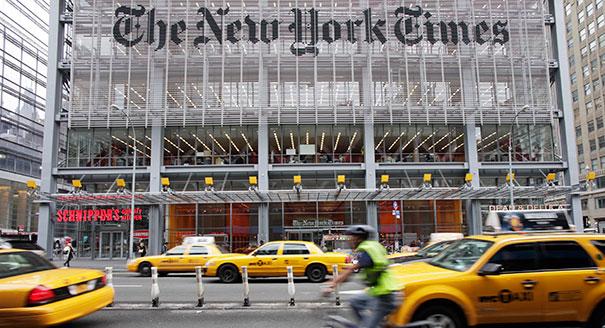Global minimum wage and environment:
What’s the New York Times's publisher,
A. G. Sulzberger gonna do?

The low-cost economy is an ecological, economic and humanitarian anomaly. The history and our children will certainly condemn us for these crimes against environment and humans. The dogmatic rhetoric of deregulated free trade in the name of competitiveness is inspired by some economic arguments already used two centuries ago by proponents of the slave trade and slavery, to protect their incomes in the production of sugar, cotton and other consumer products. Exacerbated neoliberalism is reaching its limits. Can we seriously want more free trade, and at the same time affirm that we are fighting to preserve the environment?? In 2014, a NASA study evoked a possible end of our civilization in a few decades. Everyone and even the financial markets are aware that a paradigm shift will have to be considered sooner or later. But most mainstream medias, doesn't seem ready to question old ideologies. will the editorial positioning of the new publisher of one of the world's most influential newspapers be different?
Letter to Arthur Gregg Sulzberger
 You probably know the "International Convention for a Global Minimum Wage" project, like several thousand informed economists and journalists, politicians, managers of major companies or NGO leaders around the world. Reasonable and workable, it has already been published several times in the press including in the oldest and most prestigious French newspaper liberal Le Figaro. According to a study sponsored by NASA's Goddard Space Flight Center relayed by the british daily newspaper The Guardian on March 14, 2014, "The unsustainable resource exploitation and the increasingly unequal wealth distribution" could cause the collapse of our civilization in a few decades. Our proposals are mainly oriented on these two axes : a progressive increase in the wages of workers producing goods and services for export to Western markets, by groups of economically close countries. Under this impetus, other local wages would mechanically increase over the years and the macro-economic effect would reduce poverty. This could make it possible to change, in the short or medium term, the lives of tens of millions of children, woman an men working in conditions akin to slavery. A pay increase and less quantitative production would reduce consumerism and slow down the destruction of the environment.
You probably know the "International Convention for a Global Minimum Wage" project, like several thousand informed economists and journalists, politicians, managers of major companies or NGO leaders around the world. Reasonable and workable, it has already been published several times in the press including in the oldest and most prestigious French newspaper liberal Le Figaro. According to a study sponsored by NASA's Goddard Space Flight Center relayed by the british daily newspaper The Guardian on March 14, 2014, "The unsustainable resource exploitation and the increasingly unequal wealth distribution" could cause the collapse of our civilization in a few decades. Our proposals are mainly oriented on these two axes : a progressive increase in the wages of workers producing goods and services for export to Western markets, by groups of economically close countries. Under this impetus, other local wages would mechanically increase over the years and the macro-economic effect would reduce poverty. This could make it possible to change, in the short or medium term, the lives of tens of millions of children, woman an men working in conditions akin to slavery. A pay increase and less quantitative production would reduce consumerism and slow down the destruction of the environment.
Until the publishing of our project in September 2013, the most common suggestion since the creation of the ILO in 1919, was the utopian rather than pragmatic concept of a global minimum wage based on the median wage or the cost of living of each country and including several variants sometimes discussed in your columns by economists. This idea pleases even the largest multinationals who know that the implementation of such a system would prove impossible or would take at least several decades. Funded NGO participate in this role play. This maintains the illusion that solutions are being implemented, but the cause of the global minimum wage has stalled for a century.
Will The New York Times continue, like most media and maybe by conformity, to contribute to this masquerade or, on the contrary, will it take part in the real human and ecological progress that we advocate. Your leading position in the international press gives you, more than anyone else, an ethical duty and a particular responsibility with regard to major human and environmental issues. Only concrete project of global minimum wage that could reduce slavery and environmental degradation in the coming years, it also provide us the opportunity to reflect to a new global paradigm at a time when the fire is smouldering. The global minimum wage could succeed where 23 conferences on climate and environment witch organized since 1979 have failed. Otherwise, at Davos summit meetings in 2018, the “global fracture” and rising inequality were themes that were addressed for the second consecutive year. Both heads of state and the heads of the world’s largest corporations are more and more aware of the omnipresent risk of escalating violence. Environment, justice, fear of the risk of insurrection and economic disorder, whatever the different motivations of each, the convention and its win-win consensus proposals, could be timely. Sent august 9, 2018
Francis JOURNOT International Convention for a Global Minimum Wage
Make a free website with emyspot - Signaler un contenu illicite sur ce site























